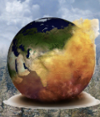Arctic Futures Initiative

© Erin Cadigan | Dreamstime
A holistic approach for the Arctic
The Arctic interacts with the rest of the world in a complex manner —socially, economically, technologically, environmentally, and politically. We aim to support the requisite system-level analysis of critical Arctic challenges to sustainability, for use by public and private decision makers in the Arctic and non-Arctic nations striving for a sustainable Arctic region.
Systems analysis for a new Arctic
A major new IIASA report highlights new and emerging policy trends in the Arctic, a region on the front lines of climate change, geopolitics, and global governance. More
Blog posts: Arctic Super Week in May 2019 and Calotte Academy
Blog posts by Lassi Heininen in Pan-Eurasian Experiment Arctic-Boreal Hub PEEX Blog. More
Nurturing cooperation, preservation, and prosperity in the Arctic
The vast 15 million square kilometer territory surrounding the North Pole commonly referred to as “the Arctic” may seem to be remote and intangible, but what happens there affects us all.
Arctic Futures Initiative brochure
A systems perspective on the plausible futures of the Arctic
PUBLICATIONS



